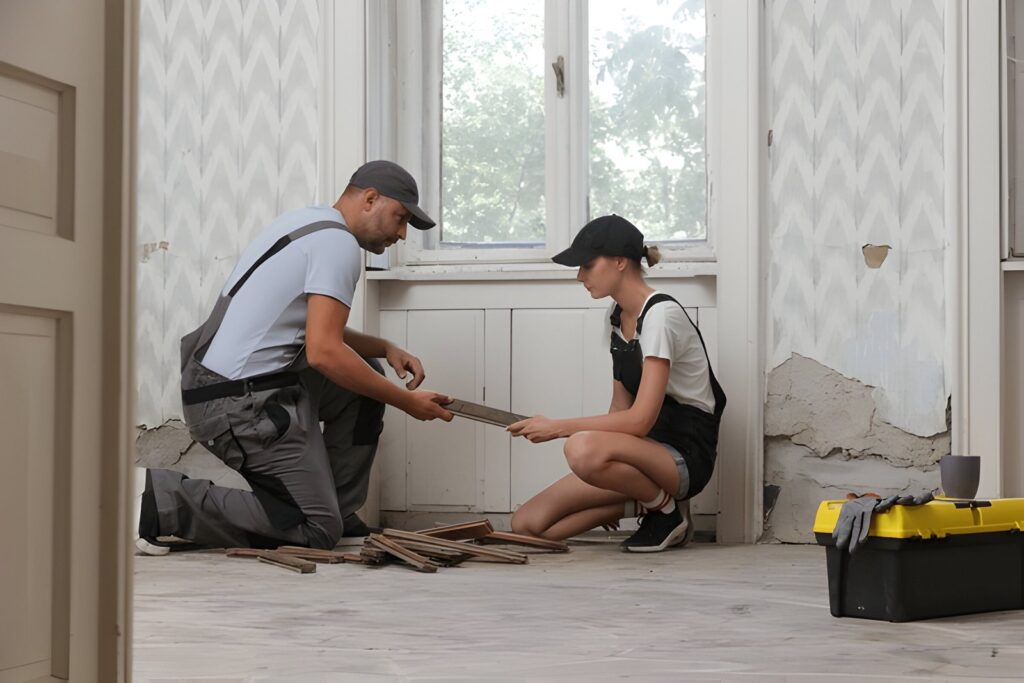
1. Introduction: The Dream of a Peaceful Retirement
Retirement is often seen as a time to relax and enjoy life. After years of hard work, the last thing anyone wants is to spend their golden years in a noisy construction zone. Whether you’re building a new retirement home or renovating your current one, planning carefully is important to avoid living in the middle of a construction site.
Retiring without the hassle of ongoing construction is totally doable with some smart planning and open communication. By focusing on smooth project management and staying in touch with your contractors, you can make sure your home is finished on time and within budget, so you can kick back and enjoy retirement stress-free.
Living in a well-planned and completed home from the start allows you to fully enjoy your retirement without the disruptions that ongoing projects can cause.
2. Planning Ahead: The Key to Avoiding Construction Delays
One of the most effective ways to avoid living in a construction zone during retirement is by planning ahead. Creating a detailed construction timeline and sticking to it is essential for ensuring that your home is completed before you move in. This timeline should account for all aspects of the project, from initial design and permitting to the final touches.
When planning your retirement home, it is crucial to allocate enough time for each construction phase. Working closely with your builder to create a realistic schedule is essential to avoid delays and keep the project on track. It’s also important to have a contingency plan in place for any unexpected setbacks to ensure the project continues to progress.
In addition to the construction timeline, consider planning your move-in date strategically. Choosing a move-in date that aligns with the completion of construction allows you to settle into your new home without the stress of ongoing work. This careful planning ensures that your retirement begins in a peaceful, finished space rather than a chaotic construction zone.
3. Selecting the Right Contractor: A Crucial Decision
Choosing the right contractor is a critical step in avoiding the nightmare of living in a construction zone during retirement. Working with an experienced, reputable contractor who has a track record of completing projects on time and within budget is essential for a smooth construction process. Make sure to thoroughly vet potential contractors by checking their credentials, references, and reviews.
A good contractor will not only have the necessary skills and experience but also understand the importance of minimizing disruption during the construction process. Discussing your expectations and concerns with your contractor upfront ensures that they are aware of your desire to avoid living in a construction zone. A contractor who values clear communication and efficient project management is more likely to meet your needs.
In addition to choosing a reputable contractor, consider hiring a project manager to oversee the construction process. A project manager can coordinate between different trades, manage the construction schedule, and ensure that work is completed efficiently. This additional layer of oversight helps keep the project on track and reduces the likelihood of delays or extended construction periods.
4. Phased Construction: Completing Work in Stages
If you’re already living in your retirement home while renovations are underway, phased construction can be an effective strategy to minimize disruption. Dividing the project into manageable phases allows you to complete work on one area of the home before moving on to the next, reducing the impact on your daily life. This approach ensures that you can enjoy your living space while construction is ongoing.
When you’re planning phased construction, it’s best to tackle the most disruptive work first. Taking care of tasks like structural changes, electrical work, and plumbing upgrades in the early phases helps you create a more peaceful environment as the project moves forward. By the time you get to the final phases, the work should be less invasive, giving you the chance to relax in your completed spaces.
In addition to reducing disruption, phased construction can also make it easier to manage your budget. By spreading the cost of renovations over time, you can avoid the financial strain of funding a large project all at once.
This approach allows you to enjoy the benefits of a completed home without the stress of living in a construction zone or facing unexpected financial burdens.
5. Temporary Housing Options: A Solution for Major Renovations
For retirees planning extensive renovations or new home construction, temporary housing can be an excellent option to avoid living in a construction zone. Moving into a temporary home during major construction work allows you to enjoy a peaceful environment while your retirement home is being built or renovated. This option is particularly beneficial for projects that involve significant structural changes or long timelines.
Temporary housing options range from short-term rentals to extended stays with family or friends. Choosing a temporary housing solution that fits your needs and budget ensures that you have a comfortable place to live while construction is underway. This approach also allows your contractors to work more efficiently, as they won’t need to accommodate your living space during the project.
While moving into temporary housing involves some inconvenience, the benefits of avoiding the noise, dust, and disruption of a construction zone are well worth it. By opting for temporary housing, you can ensure that your retirement begins in a fully completed, comfortable home, free from the chaos of ongoing construction.
6. Communicating with Your Contractor: Staying Informed and Involved
Effective communication with your contractor is key to ensuring that your retirement home is completed on time and to your satisfaction. Regular check-ins and updates with your contractor allow you to stay informed about the progress of the project and address any issues that arise. Open communication also helps prevent misunderstandings and ensures that your contractor understands your expectations.
When communicating with your contractor, it’s important to be clear and specific about your needs and concerns. Discussing potential challenges, such as weather delays or supply chain issues, helps you prepare for any potential setbacks and find solutions quickly. A contractor who values transparency and keeps you informed throughout the project is more likely to deliver a finished home that meets your expectations.
In addition to regular communication, consider setting up a system for tracking progress and addressing concerns. Using project management software or regular progress reports allows you to stay on top of the construction process and ensure that everything is moving forward as planned. This proactive approach helps you avoid the stress of living in a construction zone and ensures a smoother path to enjoying your completed retirement home.
7. Managing Your Budget: Preventing Cost Overruns
One of the most common sources of construction delays is budget overruns. Managing your budget carefully and setting aside a contingency fund can help prevent financial surprises that extend the construction timeline. By staying on top of your finances, you can avoid the stress of halted construction and ensure that your home is completed on schedule.
When planning your budget, it’s important to account for all potential expenses, including permits, materials, labor, and unexpected costs. Working with your contractor to develop a detailed budget helps you understand where your money is going and allows you to make informed decisions about where to allocate funds. A well-managed budget is essential for avoiding delays that can turn your retirement into a construction nightmare.
In addition to budgeting for the construction itself, consider the cost of any temporary housing or alternative living arrangements you may need during the project. Planning for these expenses upfront ensures that you have the resources needed to complete the project without financial strain. By managing your budget effectively, you can enjoy your retirement without the stress of unfinished construction and unexpected costs.
8. Prioritizing Quality Work Over Speed
While it’s natural to want your retirement home completed quickly, prioritizing quality work over speed is essential to avoiding future disruptions.
Ensuring that your contractor takes the time to do the job right prevents the need for costly repairs or rework down the line. A focus on quality also means that your home will stand the test of time, providing you with a comfortable and worry-free living environment.
Rushing through construction to meet a deadline can lead to mistakes and oversights that compromise the quality of your home. Working with your contractor to establish realistic timelines that allow for careful, thorough work ensures that the project is completed to the highest standards. By prioritizing quality, you can avoid the stress of living in a poorly constructed home that requires ongoing repairs.
In addition to focusing on quality during construction, it’s important to choose high-quality materials and finishes. Investing in durable, long-lasting materials ensures that your home remains in top condition throughout your retirement, reducing the need for future renovations.
By prioritizing quality in every aspect of your home’s construction, you can enjoy a peaceful retirement without the disruptions of ongoing construction.
9. Final Inspections and Touch-Ups: Ensuring a Smooth Move-In
Before moving into your retirement home, it’s essential to conduct final inspections and address any remaining issues. Scheduling a thorough walkthrough with your contractor allows you to identify any incomplete work, defects, or areas that need touch-ups. This step ensures that your home is truly move-in ready and free from the disruptions of ongoing construction.
During the final inspection, pay close attention to the details, including finishes, fixtures, and the functionality of systems like plumbing and electrical. Creating a checklist to guide your inspection can help ensure that nothing is overlooked. If any issues are identified, work with your contractor to resolve them before you move in, ensuring a smooth and stress-free transition to your new home.
In addition to final inspections, consider scheduling touch-ups or minor adjustments after you’ve lived in the home for a short period. Addressing any small issues that arise after move-in ensures that your home remains in top condition and that you can fully enjoy your retirement without the distractions of ongoing construction.
10. Enjoying a Construction-Free Retirement
After the careful planning, strategic decisions, and diligent oversight of your home-building or renovation process, it’s finally time to enjoy your retirement without the burden of construction. Settling into a finished, peaceful, and well-crafted home allows you to fully embrace the joys of retirement, free from the noise, dust, and disruption of ongoing projects.
Now that your retirement home is complete, you can focus on what truly matters—spending time with loved ones, pursuing hobbies, and enjoying the tranquility of your new environment. Creating a comfortable and stress-free living space is essential for making the most of your retirement years. Your home should be a sanctuary, a place where you can relax and unwind, without the constant reminders of unfinished work.
To ensure your home remains a place of peace and comfort, it’s important to maintain a proactive approach to home care.
Scheduling regular maintenance and addressing minor issues as they arise helps keep your home in top condition, preventing the need for future renovations or repairs. By staying on top of maintenance, you can enjoy the benefits of a construction-free retirement for years to come.
Conclusion: The Key to a Peaceful Retirement Home
Enjoying your retirement without living in a construction zone is not only possible but achievable with the right planning and execution. By carefully selecting your contractor, managing your budget, and prioritizing quality over speed, you can ensure that your retirement home is completed to your satisfaction before you move in.
This proactive approach enables you to avoid the stress and disruption of ongoing construction, allowing you to fully enjoy your retirement.
Remember, your retirement is a time to relax and enjoy the fruits of your labor. By taking the necessary steps to avoid living in a construction zone, you can ensure that your home is a peaceful retreat, providing you with the comfort and tranquility you deserve.
Whether you’re building a new home or renovating an existing one, the strategies outlined in this blog will help you achieve a construction-free retirement, allowing you to focus on what truly matters—enjoying your golden years.



